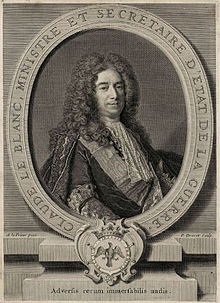Claude le Blanc
Claude le Blanc | |
|---|---|
 Claude Le Blanc, by Pierre Drevet the Younger | |
| Secretary of State for War | |
| In office 24 September 1718 – 1 July 1723 | |
| Monarchs | Louis XV, Régence |
| Preceded by | Joseph Fleuriau d'Armenonville |
| Succeeded by | François Victor Le Tonnelier de Breteuil |
| In office 16 June 1726 – 19 May 1728 | |
| Monarch | Louis XV |
| Preceded by | François Victor Le Tonnelier de Breteuil |
| Succeeded by | Nicolas Prosper Bauyn d'Angervilliers |
| Personal details | |
| Born | 1 December 1669 Rouen, Normandy, Kingdom of France |
| Died | 19 May 1728 (aged 59) Palace of Versailles, Versailles, Kingdom of France |
Claude Le Blanc (1669, Normandy – 19 May 1728, Versailles) was a French royal official of the
Early life and family
He was born in 1669 to a former
Political career
He became councilor to the parlement of
Le Blanc first became Secretary of State for War in 1718, during the
His first term as secretary ended in disgrace, exile, and imprisonment. He fell from grace due to the machinations of the
The Louisiana colony
When prospects for the French Louisiana colony were high, Le Blanc joined with Belle-Isle to purchase a land grant in the colony.[9] He sponsored Dumont de Montigny, to whom he had family connections, as a lieutenant and engineer to develop the land grant,[9] though he may have regretted the choice–Dumont quarreled with both Governor Bienville and his superior Pierre Le Blond de La Tour. A series of letters from both Le Blond and Dumont to Le Blanc, each denouncing the other, led Le Blanc to reply back that they "complain well of one another."[10]
Personal life
Le Blanc married Madeleine Petit de Passy, the daughter of the president of the parlement of Metz. They had a daughter, Louise-Madeleine Le Blanc, who married Claude-Constant-Esprit Jouvenel de Harville des Ursins.[2]
He was one of the signatories on the wedding contract of Francois Poisson and Louise-Madeleine de la Motte, the parents of Jeanne-Antoinette Poisson, later known as Madame de Pompadour. The young bride shortly thereafter became the mistress of Le Blanc, and later of his brother the bishop of Avranches.[3] He was the subject of a portrait by the celebrated engraver Pierre Drevet the Younger.[11]
References
- ^ Emsley, Clive "Gendarmes and the State in Nineteenth-Century Europe" pg. 15-18
- ^ a b c d "Bulletin de la Commission Historique du Déparatement du Nord, Vol. 18" (in French) pg. 221
- ^ Lever, Evelyne "Madame de Pompadour: A Life"pg. 24
- ^ Campbell, Peter "Power and Politics in Old Regime France, 1720-1745" pg. 339
- ^ Opsommer, Rik "Ypres and the Franco-Belgian Border" pg. 33
- ^ Campbell pp. 57-58
- ^ a b Swann, Julian "Exile, Imprisonment, or Death: The Politics of Disgrace in Bourbon France" pp. 140-141
- ^ Campbell pg. 112
- ^ a b Sayre, Gordon M. and Zecher, Carla "The Memoir of Lieutenant Dumont, 1715-1747" pg. 3
- ^ Dawdy, Shannon Lee "Building the Devil's Empire: French Colonial New Orleans" pg. 39
- ^ Bryan, Michael "A Biographical and Critical Dictionary of Painters and Engravers, Vol. 1" pg. 363
